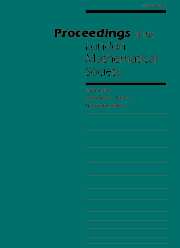Article contents
Duality for general Lipschitz classes and applications
Published online by Cambridge University Press: 01 July 1997
Abstract
As shown by the author in{\em Proc.\ Amer.\ Math.\ Soc.} 115 (1992) 345–352, for every metric space$(K,d)$ with compact closed balls one has $(\mbox{lip}\,\varphi(K))^{**} =\mbox{Lip} \,\varphi (K),$ where $\varphi$ is any majorant (that is,non-decreasing function on ${\Bbb R}_+$ with $\varphi (0+) = \varphi (0) = 0$)such that $\varphi(t)/t$ monotonically tends to $+\infty$ as $t\rightarrow 0.$Here $\mbox{Lip}\,\varphi(K)$ is the Lipschitz space on $K$ with respect to themetric $\varphi(d),\ \mbox{lip}\,\varphi(K)$ is the corresponding’little‘ Lipschitz space of functions vanishing ’atinfinity‘, and ’=‘ means ’canonically isometricallyisomorphic‘. The main idea of the proof consisted of finding a normed space$M$ such that $M^* = \mbox{Lip}\,\varphi(K)$ and $M^c =(\mbox{lip}\,\varphi(K))^*,$ where ’$c$‘ stands for the completion,and identifying $M$ with the space of Borel measures on $K$ equipped with theKantorovich norm.In the present paper, this argument is carried over togeneralized Lipschitz spaces on ${\Bbb R}^n$ defined in terms of higher orderdifferences. For an integer $k$ and for a majorant $\varphi$ with $\lim_{t\rightarrow 0}\varphi(t)/t ^k = +\infty,$ define $\Lambda ^k_\varphi$ to be thespace of all bounded functions $f$ on ${\Bbb R}^n$ such that for some constant$C,\ \omega_k(f\,;t) \leq C\varphi(t)$ for all $t\geq 0$, where$\omega_k(f\,;\cdot)$ is the $k$th modulus of continuity of $f$. Let $\lambda^k_\varphi$ be the (closed linear separable) subspace in $\Lambda ^k_\varphi$which consists of functions $f$ vanishing at ’infinity' and such that$\lim_{t \rightarrow 0}\omega _k(f\,; t)/\varphi (t) = 0.$ We introduce anappropriate analogue $\Vert \cdot \Vert_{k,\varphi}$ of the Kantorovich norm onthe space $M$ of finite Borel measures on ${\Bbb R}^n$ with compact support. Theproperties of this norm for $k \geq 2$ are significantly different from those ofthe Kantorovich norm ($k = 1$) which reflects the difference in analytic natureof generalizedLipschitz spaces versus classicalones. However, the core of theduality theory survives, and it is shown that$(M, \Vert\cdot \Vert _{k,\varphi})^* = \Lambda ^k _\varphi,\ \ (M, \Vert \cdot \Vert _{k,\varphi})^c =(\lambda ^k _\varphi)^*$ and consequently, $(\lambda ^k _\varphi )^{**} = \Lambda^k _\varphi$. Several applications of these results are discussed, and a few openproblems are formulated.
1991 Mathematics Subject Classification:46E15, 46E35.
Keywords
Information
- Type
- Research Article
- Information
- Copyright
- London Mathematical Society 1997
- 5
- Cited by

